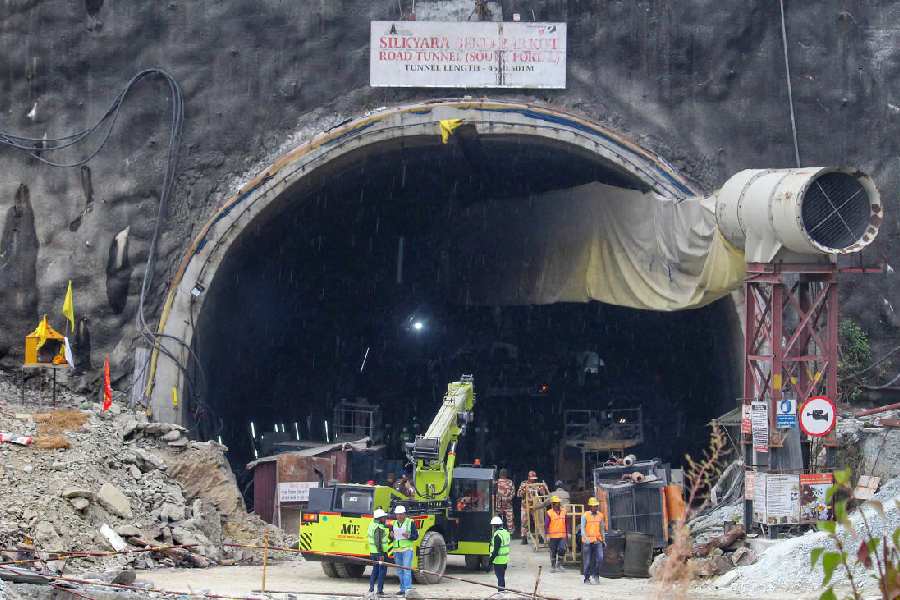Work on the collapsed Uttarkashi tunnel has resumed from the Barkot side as authorities wait for the inquiry report that will explain the subsidence at the Silkyara end that had trapped 41 construction workers for 16 days last month.
An expert, however, warned that such disasters would go on occurring if tunnelling norms — including geological research, impact assessments and the creation of escape routes — continue to be ignored.
“The inquiry is in progress on the Silkyara side of the mountain tunnel but the construction company has started its work from the Barkot side,” Anshu Manish Khalkho, director of the National Highway and Infrastructure Development Corporation Limited, told reporters in Uttarkashi.
A part of the tunnel had collapsed on November 12 morning, allegedly because of a landslide.
But some experts had accused the construction company of ignoring safety stipulations as well as geological faults in the rush to complete the tunnel, part of Prime Minister Narendra Modi’s pet Char Dham pilgrimage project.
The debris of the collapse — 270m from the mouth of the tunnel at Silkyara — had penned the 41 victims behind a 57-metre-thick wall of rock. After imported auger machines failed, “rat-hole” miners manually bore an escape tunnel through the last 12 metres of the debris. The trapped workers were brought out in the evening of November 28.
“The construction company will bear the cost of the rescue operation,” Khalkho said.
Uttarakhand chief minister Pushkar Singh Dhami has so far sidestepped every question on the expenses incurred in the prolonged rescue operation, which involved dozens of Indian agencies as well as foreign companies and experts.
Dhami on Thursday handed over cheques for Rs 50,000 to each of the 12 rat-hole miners employed in the operation.
“This money was allocated by the Uttarkashi administration, which also provided the cheques for Rs 1 lakh that each of the 41 trapped labourers were given,” a government source said.
The Union minister of state for road transport and highways, V.K. Singh, had made it clear even before the rescue that the project wouldn’t be shelved. “The future of the project is very bright,” he had said on November 26.
Ravi Chopra, a developmental scientist in Uttarakhand, said: “Silkyara-like incidents shouldn’t surprise us if we understand the nature of our mountains. A minor violation of rules can easily lead to such an incident.”
Chopra had resigned as chairman of a high-powered committee, formed by the Supreme Court in 2022 to report on the viability of the Char Dham all-weather highway project, in protest against what he considered an unjustified free hand given for road-widening.
“Meticulous geological research is a must before the launch of such (tunnel) projects but it was not done in Silkyara’s case,” he said.
“Whatever study was done was not completed because they were in a hurry to construct the tunnel. An impact assessment was not done, either. Safety measures were ignored and (sideways) exit tunnels were not made.”
A villager in Barkot told reporters: “About 40 labourers and some heavy equipment including auger machines, slurry machines and backhoes began digging through the radi top (hillock) on Thursday morning. They have cordoned the area off.”
Once completed, the 4,531m tunnel will reduce travel between Gangotri and Yamunotri by about 25km.










